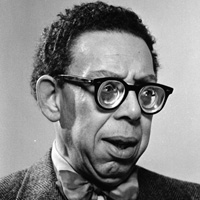Those Winter Sundays by Robert Hayden: Summary and Analysis
Those Winter Sundays by Robert Hayden, a significant modern black voice in poetry, is a 14 lined unrhymed poem which articulates the father-son relationship. It describes a child's memory about his father in his childhood days and his regrets on treating his father indifferently and coldly responding to his love languages.

Robert Hayden (1913-1980)
If, in fact, the poem is autobiographical and the father to whom he refers is William Hayden, the poet does not condemn him for the beatings that, by his own admission, lead Hayden into periods of depression. Instead, he gives the man credit for his kind deeds, which he consistently performed despite the fact that they event unappreciated. He gives lyric expressions to the memories of his father related to his childhood stage.
In this short poem, the speaker recalls the suffering experienced by his father in every winter Sundays. Usually on Sundays, other people got rest and comfort, but even during the holidays his father had to work despite his suffering of weeklong hard labor. With the inclusion of the introductory phrase, "Sundays too", Hayden indicates that while his father had the day off and could have continued to sleep, he did not. Instead, he confronted the cold in order to chase it away. The task required effort and may have involved discomfort, if not pain. From hard weekday labor, the man's hands ache and his skin is cracked, Hayden tells the reader. Hayden closes this five-line stanza with the frank declaration that no one ever thanked the man for these efforts. Nobody understands the suffering of his father. Despite this limitation, father-son love was prospering, however in lonely offices. After the father makes the room warm, he calls his son to enjoy the warmth.
In the second four-line stanza, the speaker acknowledges his experience as a boy, waking to hear the effect of the fire's warmth of the house, which he describes as an audible noise of "splintering, breaking", an image that recalls the cracking of ice. The son in great fear of the anger of the house members would rise slowly and get dressed. The son can feel the anger, coldness and carelessness of other family members who talk to him indifferently and despite his act of driving the cold from house by making a fire, he would be insulted. Instead of giving thanks to him for working on Sundays and making a fire, he would be shouted at and they would act mercilessly. The words like 'slowly' and 'indifferently' stands for son's comprehensive attitude towards his father to be insulted in any way. He is the only person in the house who understands his father well.
The father does not rouse the boy immediately or force him to face the same cold darkness he did. The father waits until the rooms are warm, which is another distinct kindness. Still, at the end of this second stanza, the speaker indicates that he would dress slowly, aware (and fearful) of the "chronic angers of the house." He does not specifically indicate what the angers relate to or to whom they are attributed.
By the final five-line stanza, the speaker declares that his usual response to his father was, he feels now, ungrateful indifference. In the final line, he indicates that love sometimes expresses itself unassumingly, through actions rather than demonstrative expression. At the time, he felt only the negative energy that resided in the house and not of the effort his father went to in order to warm the house and polish his shoes. What is not directly stated, but clearly implied is that the speaker, now an adult himself, better understands the plights of adulthood and the exertions his father completed for his son's comfort
The poem is open to multiple interpretations. If we interpret this poem or regard the speaker as black, it's about the racial discrimination. The father son relationship in the poem is quite noticeable. Father polishes the shoes. Gives him warmth and care as well. Son too, speaks indifferently to the father as if he does not know. If they were seen intimate, probably father would be offended by the master. Moreover, he gets up slowly not to give any hint to the master and prevent the anger of any kind. Both father and son give the mutual care to each other.
Through this poem, the poet shows how racial demarcation fails to control human love despite its control of all human activities. It can control the speech or language and the behavior as well. But racial demarcation cannot control human love. Therefore, if anything, can challenge the racial domination that is love or bonding among the blacks. The racial discrimination might control and suppress all human activities, but not love. So is the case with poverty as well. The whites or the masters did not allow son and father to be intimate. But despite this contrast, they were always intimate. A poor has understood the other poor, son has understood the father and black has understood the black. So, it's only in the bonding, the speaker locates hope.
